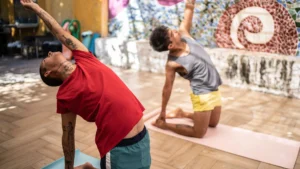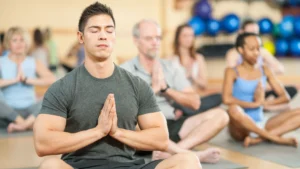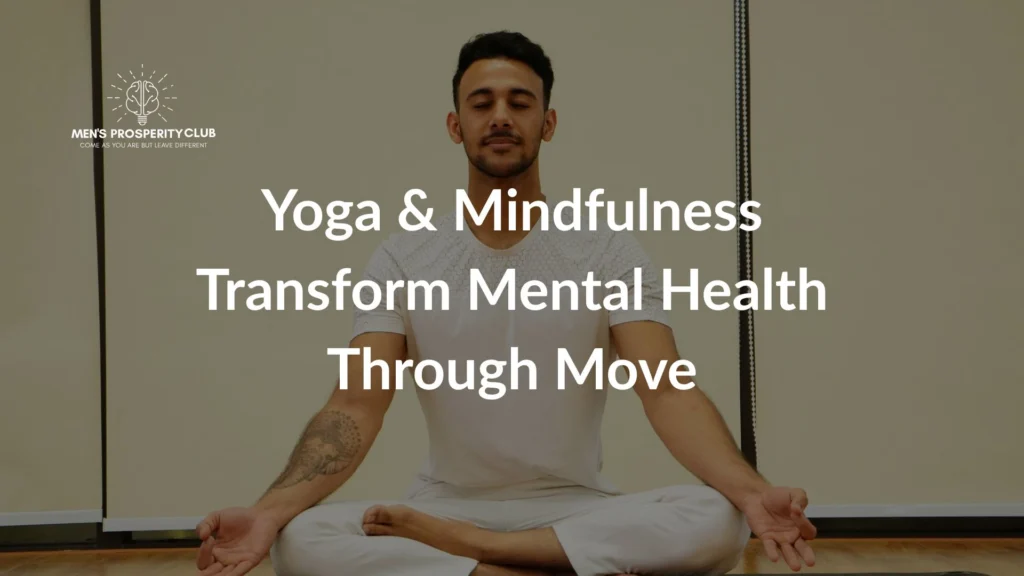Mental health challenges have reached unprecedented levels across the United Kingdom, yet an ancient practice offers remarkable hope. Yoga and mindfulness combine to create a powerful approach that transforms both body and mind through intentional movement.
The Mental Health Crisis in Britain
There were 2.15 million persons in touch with mental health services at the end of July. In July 2025, there were 499,834 new referrals to services. Meanwhile, latest estimates put the mental health waiting list at 1.7 million people (2025). These staggering figures highlight an urgent need for accessible, effective interventions.
However, emerging evidence suggests that yoga and mindfulness practices offer significant benefits. A vast number (93.2%) of UK yoga students report an improvement in symptoms of depression when doing yoga, 98.4% see their stress symptoms reduced and 97% manage their anxiety well with yoga.
Understanding the Mind-Body Connection
Traditional medicine often separates physical and mental health, yet research increasingly demonstrates their profound interconnection. When we engage in mindful movement through yoga, we activate multiple pathways that enhance psychological wellbeing.
Firstly, yoga stimulates the parasympathetic nervous system, which governs our body’s relaxation response. Consequently, stress hormones like cortisol decrease whilst beneficial neurotransmitters such as GABA increase. Furthermore, the practice enhances vagal tone, improving our capacity to regulate emotions and respond thoughtfully rather than reactively.
Moreover, yoga encourages present-moment awareness, which breaks the cycle of rumination that often fuels anxiety and depression. Through focused breathing and physical postures, practitioners develop mindfulness skills that extend far beyond the yoga mat.

The Science Behind Yoga’s Mental Health Benefits
Research consistently demonstrates yoga’s effectiveness in addressing various mental health conditions. Studies reveal that regular yoga practice produces measurable changes in brain structure and function, particularly in regions associated with emotional regulation and stress management.
Additionally, yoga increases levels of brain-derived neurotrophic factor (BDNF), a protein crucial for neural growth and protection. This enhancement supports cognitive function whilst potentially reversing some effects of chronic stress on the brain.
Inflammation markers also decrease through consistent practice. Since chronic inflammation links to depression and anxiety, yoga’s anti-inflammatory effects contribute significantly to improved mental health outcomes.
Mindfulness as the Foundation
Mindfulness forms the cornerstone of therapeutic yoga practice. Being aware of ourselves and the world around us, which is sometimes termed mindfulness, can help us feel better mentally. This awareness transforms our relationship with difficult thoughts and emotions.
Rather than avoiding or fighting uncomfortable feelings, mindfulness teaches acceptance and observation. Practitioners learn to witness their mental patterns without becoming overwhelmed by them. This shift in perspective reduces suffering whilst increasing resilience.
Subsequently, mindful awareness extends into daily life. Individuals report greater emotional stability, improved relationships, and enhanced overall life satisfaction. These benefits accumulate over time, creating lasting positive changes.
Practical Applications for Mental Wellness
Breath-Centred Practices
Breathing techniques, or pranayama, offer immediate relief from anxiety and stress. Simple practices like three-part breathing or alternate nostril breathing can be performed anywhere, providing accessible tools for managing difficult moments.
Furthermore, breath awareness anchors attention in the present moment, preventing the mind from spiralling into worry or rumination. Regular practice strengthens the connection between breath and emotional state, offering greater self-regulation.
Gentle Movement Sequences
Slow, mindful movements help release physical tension that often accompanies emotional distress. Gentle stretches and flowing sequences encourage the body to let go of stored stress whilst building strength and flexibility.
Additionally, movement meditation cultivates body awareness, helping individuals recognise early signs of stress or emotional dysregulation. This enhanced sensitivity enables proactive self-care rather than reactive coping.
Meditation and Relaxation
Seated or lying meditation practices directly target the nervous system’s relaxation response. Progressive muscle relaxation, body scans, and guided imagery all contribute to deep restoration.
Meanwhile, regular meditation practice rewires the brain for greater calm and clarity. Even brief daily sessions produce measurable improvements in mood, attention, and emotional regulation.
Building a Sustainable Practice
Starting Small
Many people feel intimidated by yoga, assuming it requires extreme flexibility or spiritual commitment. However, therapeutic yoga emphasises gentle, accessible movements suitable for all bodies and abilities.
Beginning with just five to ten minutes daily creates a sustainable foundation. Short practices prove more beneficial than sporadic lengthy sessions, as consistency builds neural pathways that support lasting change.
Creating Sacred Space
Designating a quiet space for practice, however small, enhances commitment and focus. This dedicated area signals to the mind that it’s time to shift into a more mindful state.
Subsequently, simple rituals like lighting a candle or playing calming music help transition from daily activities into practice. These cues become powerful triggers for relaxation and introspection.
Seeking Guidance
Mental health issues (41%) are most commonly disclosed to yoga providers, indicating that many instructors understand the therapeutic applications of their teaching. Qualified teachers can adapt practices to individual needs whilst ensuring safety and effectiveness.
Additionally, trauma-informed yoga approaches specifically address the unique needs of those with mental health challenges. These specialised classes create safe environments for healing and growth.
Addressing Common Obstacles
Physical Limitations
Yoga’s adaptability makes it accessible regardless of physical capabilities. Chair yoga, gentle stretching, and breathing practices offer benefits without requiring traditional poses.
Furthermore, props like blocks, straps, and bolsters support the body whilst making poses more comfortable. The practice evolves with individual needs, ensuring long-term sustainability.
Time Constraints
Modern life often feels overwhelming, yet yoga and mindfulness can integrate seamlessly into daily routines. Brief morning stretches, workplace breathing exercises, or bedtime relaxation sequences all contribute to mental wellness.
Moreover, mindful moments throughout the day—such as conscious breathing whilst waiting or gentle stretches at the desk—accumulate to create significant benefits.
Scepticism and Resistance
Some individuals feel resistant to practices that seem unfamiliar or spiritual. However, approaching yoga and mindfulness from a scientific perspective can address these concerns whilst still providing profound benefits.
Additionally, focusing on practical outcomes rather than philosophical aspects helps sceptical individuals engage with the practices. The measurable improvements in mood and stress levels speak for themselves.

Building Community and Connection
Group Classes and Shared Experience
Attending yoga classes creates opportunities for social connection, which itself supports mental health. Yoga sessions are widely available in the UK, offering numerous opportunities to connect with like-minded individuals.
Furthermore, sharing the journey with others reduces isolation whilst providing motivation and accountability. Group energy often enhances individual practice, creating a positive feedback loop.
Online Resources and Accessibility
Digital platforms have revolutionised access to yoga and mindfulness instruction. High-quality classes are available at any time, removing barriers related to location, schedule, or social anxiety.
Additionally, online communities provide support and encouragement for practitioners at all levels. This virtual connection proves particularly valuable for those with mobility limitations or social concerns.
Integration with Professional Care
Yoga and mindfulness complement rather than replace professional mental health treatment. Mindfulness-based cognitive therapy (MBCT) can improve clinical outcomes when integrated with traditional therapeutic approaches.
Healthcare providers increasingly recognise these practices as valuable adjunct treatments. Many NHS trusts now offer mindfulness programmes alongside conventional therapies, acknowledging their evidence-based benefits.
Subsequently, individuals can work with both mental health professionals and qualified yoga teachers to create comprehensive wellness plans. This integrated approach addresses multiple aspects of healing whilst honouring individual preferences and needs.
Looking Forward: A Path to Wellness
The growing body of research supporting yoga and mindfulness for mental health creates optimism for the future. 79% of UK yoga students find they sleep better, demonstrating the practice’s wide-ranging benefits beyond emotional regulation.
As awareness increases and access expands, these ancient practices offer hope for addressing modern mental health challenges. The combination of scientific validation and accessible techniques creates unprecedented opportunities for healing and growth.
Rather than viewing mental health as a destination, yoga and mindfulness teach us to embrace the journey. Through gentle movement, mindful breathing, and present-moment awareness, we discover our innate capacity for resilience and wellbeing.
The path forward requires patience, compassion, and consistent practice. However, countless individuals across the UK have already discovered the transformative power of combining movement with mindfulness. Their experiences illuminate a hopeful future where mental wellness becomes accessible to all through the simple yet profound practices of yoga and mindful awareness.




